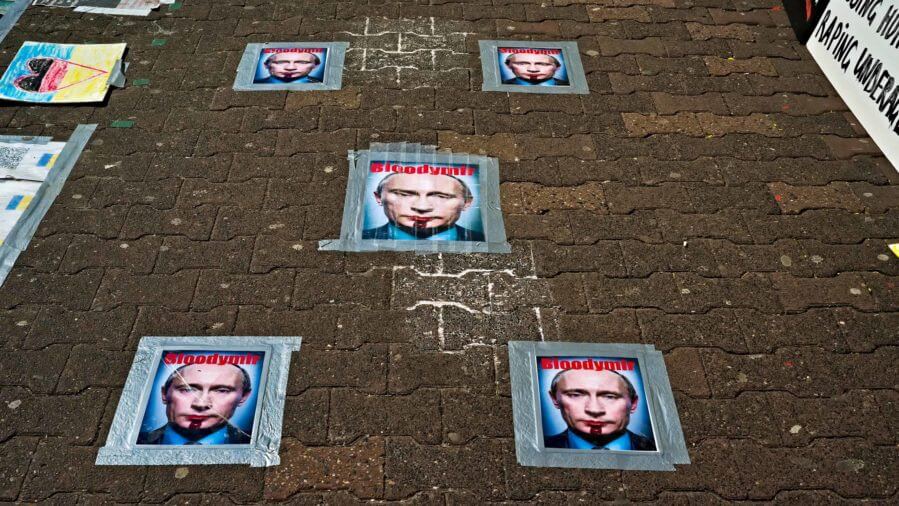

Words influence the way we see the world.
In 2015, we warned that the language used by the west to describe Russia’s armed intervention in Ukraine was a jumble of euphemism and understatement that failed to serve the public interest.
The problem hasn’t gone away. Today there may be a reckoning in the west with how political and business interests have long accommodated the barbarism of Vladimir Putin’s regime for profit and short-term gain. But there is one form of appeasement that we have yet to confront. This appeasement comes in the form of our words.
Check the headlines about Ukraine. How many of them bend over backwards to avoid even mentioning Russia? Instead, they speak of the “Ukraine war” or “Ukraine conflict”. We read about “Ukraine at war” or “the situation in Ukraine”. Even public gestures are curiously neutral – such as the moment of silence and statement of solidarity for the people of Ukraine observed at the 2022 Academy Awards, which failed to acknowledge the very state responsible for unleashing death and destruction in the heart of Europe.
Such verbal appeasement is casual, almost unconscious – but it is dangerous all the same. It not only misrepresents what is happening today, but also undermines our ability to imagine and prepare for what can happen tomorrow. For the sake of Ukraine’s future and the sake of our own security, the world needs to speak of this war clearly and directly.
Call out Russian aggression – relentlessly
This is Russia’s war against Ukraine. Russia chose to wage war against Ukraine in 2014 and has chosen to escalate it in 2022. Our headlines and reports should not shy away from the fact that Russia is the one state that could end the war right now.
This failure to make Russia the focal point also gives cover to Putin’s toxic rhetoric of grievance that disavows responsibility for Russia’s own behaviour and frames every action as a “look at what you made me do” reaction – always blaming the victim.
But talk of “Putin’s war” is also obfuscation. According to recent polls, most Russians support the war and the vast majority of Russians approve of Putin. Make no mistake: widespread Russian neo-imperialism is a threat to global security.
Russia’s war against Ukraine is a textbook war of aggression. On February 21, Putin explicitly attacked the very concept of Ukraine’s sovereignty, claiming that it had no “real statehood”. Three days later, he began to bomb Ukraine and kill its citizens. On March 2, the UN General Assembly accordingly declared Russia’s invasion an act of “aggression against Ukraine” by an overwhelming margin, 141-5.
Avoiding the term “aggression” when reporting the war is not only to take pains to look past Putin’s explanations of his actions but also to dismiss the judgment of the vast majority of the world’s sovereign states.
Highlight Ukraine’s right to self-defence
Ukraine is fighting in self-defence, which is a right of all states under the UN Charter. Calling this a “Russia-Ukraine War”, which has become a shorthand, implies parity between the sides and muddles the key distinctions between aggressor and defender. Don’t just take our word for it: on March 16, the International Court of Justice (ICJ) focused attention on Russia’s armed attack against Ukraine and called on Russia alone to suspend its operations.
The Kremlin has ignored the ICJ’s order, and Russian conduct in Ukraine is now the subject of active investigations at the International Criminal Court. Shelling hospitals, deploying cluster bombs, starving encircled civilian populations – such actions appear to have become standard Russian military operating procedure in Ukraine. And the harrowing reports of mass murder in the wake of Russia’s retreat from Kyiv show that crimes against civilians are not only a systematic Russian practice but a strategic Russian objective.
Especially when we frame these crimes against the backdrop of dehumanising Russian propaganda about Ukraine and Ukrainians, a deliberate and murderous agenda becomes clear. Putin and his proxies in Russia’s state media deny the right of a sovereign Ukraine to exist, openly call for a “de-Ukrainization” of the country and the violent “liquidation” of its political elite, and even unabashedly embrace the idea of genocide on prime-time television.
This collusion of word and deed, demonstrating an “intent to destroy” the Ukrainian nation “in whole or in part”, should leave no doubt that Russia aims at genocide in Ukraine. Hopes for diplomatic solutions and political compromises must confront this reality.
Learn from the mistakes of the past
With this massive military invasion of Ukraine, Putin has stopped hiding behind troops without insignia, as he did in Crimea in 2014. He has stopped hiding behind the screen of a contrived “civil war in Ukraine”, as he has done in Donbas since 2014.
Putin has torn off a mask. So whenever we refer to events before this brutal escalation, there is no need for us to put the mask back on for him. This means discarding, once and for all, the term “referendum” to describe the coerced and hastily arranged performance of a vote that followed Russia’s forcible annexation of Ukraine’s Autonomous Republic of Crimea in 2014. It means discarding the terms “rebels” or “separatists” in Donbas for what they clearly have been all along: Russian proxies in Russian-occupied eastern Ukraine.
Words shape our world, and the cause of peace suffers when we employ empty terms, invite false equivalences, or avoid foregrounding the state responsible for a war that involves us all. It’s time to stop appeasing Putin’s Russia with our words.
from ScienceBlog.com https://ift.tt/x8nwNmB

No comments:
Post a Comment